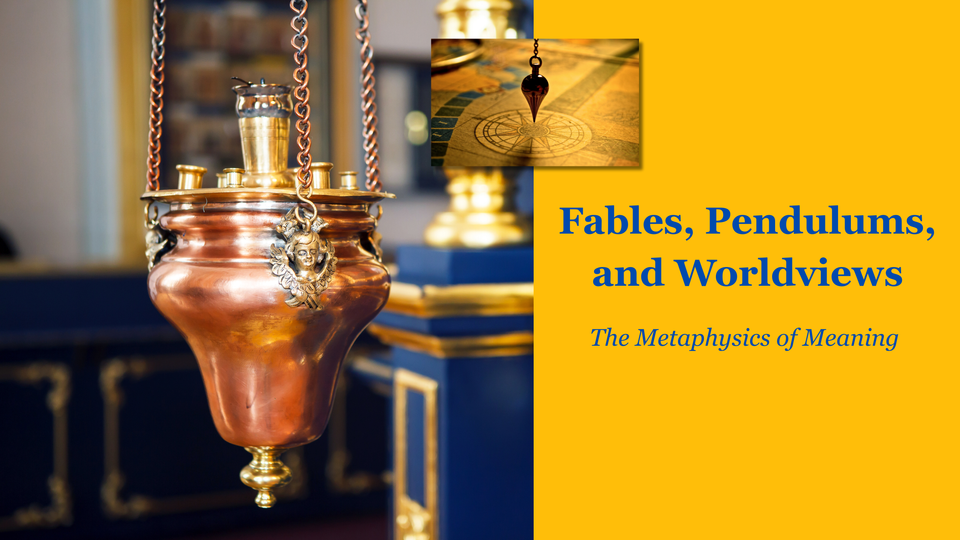As the Lamp Swings

Other than the first man and woman, the rest of humanity has been born into a world as a baby. A baby’s task is to make sense of the world populated by a few smiling faces yet many whose motives remain uncertain. It is this universal instinct for survival through pre-judgment that has brought about the need for and prevalence of fairy tales and children’s stories. These stories speed up the maturation process in small children as they anticipate the challenges one might likely encounter. Eventually, children’s stories are not enough. A young adult begins to look around like Galileo in the Cathedral of Pisa wondering how the altar lamp swings at the same rate no matter how wide the arc as long as the suspension of the pendulum remains constant. In other words, how do things work? Who is in charge? And lastly, where and how do I fit into this system?
Looking at, though rarely understanding, the different eras of pre-modern, modern, and post-modern worldviews, one can’t help but wonder if these three ways of explaining the important questions have existed in all ages. To oversimplify for the sake of brevity, pre-moderns often saw truth as originating beyond the physical world. They applied reason to their understanding of men, celestial bodies, and sacred writings. Enlightenment thinkers, reacting to the religious and political conflict of the Protestant Reformation, searched for arguably a more reliable, observable, repeatable, falsifiable, and quantitative source of truth through the senses and precise scientific instruments. The moderns eventually settled into a utilitarian mindset optimizing the system for gain and benefit. The post-moderns, having given up on objective truth all together, set their sights on creating a communal mass mind. Post-moderns, as a reaction against the failures of modernism, substituted will and emotion as foundational ingredients for uniting people instead of special revelation, reason, observation, and utilitarianism.
It is hardly noteworthy to state that humanity will tend to seek freedom from restraint, obligation, and scarcity reflexively. Yet, how does one produce the desirable qualities of character without self-control, perseverance without duty, abundance without economizing, and meaning without sacrifice? Too often, humans have mimicked what they see others attending to, practicing for, and partaking in. It is through the imagination, both a mirror and a light, that true freedom becomes possible by veering off or resisting the cultural current ever surrounding human societies.
George Washington at the end of the Revolutionary War was urged by his generals to seize power for himself thereby becoming the new king of the United States. Misty eyed at the love and loyalty expressed by his faithful commanders, he resisted. A fifth century B.C. Roman patrician and military leader named Cincinnatus was his model. The late Roman Republic, when facing a formidable foreign force, at times would summon a qualified individual to assume absolute power over the state to defeat the adversary. Cincinnatus was called and went off to defeat the Aequi, an Italic force. Within sixteen days, he had achieved the conquest. Afterwards, the general returned to Rome, relinquished power to the Senate, and journeyed back home. This is the pattern General Washington wanted to repeat. George Washington mirrored Cincinnatus and illuminated how civic virtue in leadership would come to be revered in the new Republic. This example didn’t have its root in utilitarianism or emotion, rather it burrowed deep into a civic virtuous act of the past, recorded by Livy, which drew on tradition as a source of inspiration.
As young men and women of today wrestle with the decisions and direction of their lives, the imagination takes center stage. What can they call on to resist the ideology of the day? Can they summon the virtuous acts of the past? Can they find purpose in seeking to serve a community without losing their reason and discernment? Are they free to abstain from what presents itself to be the most pleasurable option to them in the moment for a greater reward from God in the future? Only by beginning to perceive and attend to one’s worldview, weighing the tradeoffs implicit in any decision, and reconciling the best actions of the past against the backdrop of today can one start to properly imagine a future worth preserving through self-control, perseverance, and wisdom.